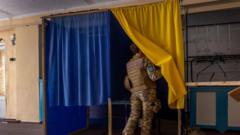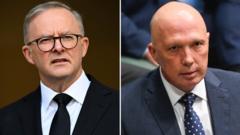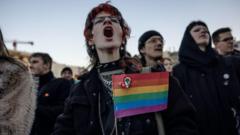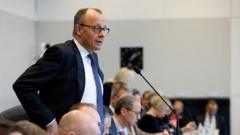In the recent Irish general election, Fianna Fáil emerged as the largest party, winning 48 seats, while their coalition partner Fine Gael followed closely with 38 seats. As new coalition discussions loom, Sinn Féin remains determined to be part of the dialogue. With the Green Party suffering a significant reduction in representation, the political fabric of the Dáil is poised for substantial change.
Fianna Fáil Sweeps to Victory in Latest Irish General Election

Fianna Fáil Sweeps to Victory in Latest Irish General Election
The political landscape of Ireland shifts as Fianna Fáil secures the most seats, challenging traditional coalitions and fuelling negotiations for government formation.
Fianna Fáil has secured a decisive victory in the Republic of Ireland's general election, emerging as the largest party in the Dáil (lower house of parliament) with 48 seats. The main opposition party, Sinn Féin, garnered 39 seats, while coalition partner Fine Gael fell to third place with 38 seats. This election saw candidates contesting for 174 available seats, with a goal of attaining 88 for a majority; together Fianna Fáil and Fine Gael currently hold 86 seats.
Voter turnout was notably low, at 59.7%, the lowest seen in over a century. Deputy leader of Fianna Fáil, Jack Chambers, indicated on RTE's Morning Ireland that coalition negotiations are expected to be protracted but not as drawn out as previous discussions, which lasted five months. The Green Party, previously holding 12 seats, faced a grim fate in this election, managing to retain only one seat.
As political factions consider government formation, Labour and the Social Democrats, each securing 11 seats, could be potential allies for Fianna Fáil and Fine Gael. Meanwhile, Sinn Féin has expressed an intention to engage with other progressive parties to ensure critical issues such as housing, healthcare, and cost of living are prioritized in upcoming negotiations.
Sinn Féin TD Eoin Ó Broin signified the party's commitment to conversations with like-minded political organizations, underlining that no agreements have been finalized yet. Chambers reiterated that there are significant ideological divides between Fianna Fáil and Sinn Féin, making collaboration on policy challenging.
Emer Currie, a newly elected Fine Gael representative, conveyed optimism about the coalition's future, suggesting voters appreciate the current two-party system's collaboration. Conversely, Cian O'Callaghan from the Social Democrats acknowledged the complexities of leftist political dynamics post-election, emphasizing individual parties' roles in election campaigning.
The Green Party's electoral collapse has sparked disappointment within its ranks, especially given their previous legislative successes. Political analyst Lisa Keenan highlighted the difficulty the party faces in the aftermath, having seen their representation wane drastically.
As Fianna Fáil navigates its path forward in the Dáil, a multitude of coalition compositions remain possible, setting the stage for intense negotiations that will shape the future governance of Ireland.





















